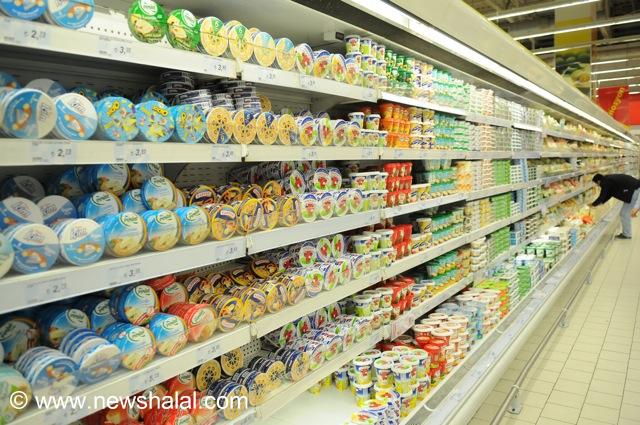(Dubai-NewsHalal, Rabi`II 26, 1437, February 5, 2016) Global Halal market to reach $3.7 trillion by 2019 while halal food sector alone will grow to a valuation of $2.537 trillion by same year.
According to the latest Global Islamic Economy Report, worldwide spending on global Halal food and lifestyle products could rise 10.8% a year until 2019.
“Last year has seen major advancements in the global Halal food and lifestyle sectors. These include investments by a Brazilian Halal food provider in a UAE production plant, new Halal testing technologies from France, Malaysia and the Emirates and international marketing of Dubai as a new Halal and Islamic Economy hub”. The revealed report commissioned by the Government of Dubai and produced by ThomsonReuters in collaboration with strategy and research advisory firm DinarStandard.
Notably, the Halal tourism sector – a huge driver of food, beverage and hospitality sales – has also advanced following product investments in the UAE, the Maldives, Spain, Japan, the Philippines and Russia amongst others. The lucrative Halal tourism market now represents 11.6% of global tourism expenditure – excluding the busy Haj and Umrah seasons – and is expected to be worth $238 billion by 2019.
 The 2015 State of the Global Islamic Economy Report revisits the Halal Travel Indicator to evaluate countries’ health and development of its Muslim market travel ecosystem. This indicator is part of the aggregate Global Islamic Economy (GIE) Indicator. The Halal Travel Indicator does not focus on the overall size and growth trajectory of a country in this sector; instead it evaluates countries on relative strengths of the ecosystem they have for the development of the sector. Malaysia, UAE and Singapore continue to lead the Halal Travel Indicator ranking that focuses on the health of the Muslim-friendly travel ecosystem a country has relative to its size.
The 2015 State of the Global Islamic Economy Report revisits the Halal Travel Indicator to evaluate countries’ health and development of its Muslim market travel ecosystem. This indicator is part of the aggregate Global Islamic Economy (GIE) Indicator. The Halal Travel Indicator does not focus on the overall size and growth trajectory of a country in this sector; instead it evaluates countries on relative strengths of the ecosystem they have for the development of the sector. Malaysia, UAE and Singapore continue to lead the Halal Travel Indicator ranking that focuses on the health of the Muslim-friendly travel ecosystem a country has relative to its size.

Touching on non Muslim countries, the report mentioned Japan`s efforts to attract Muslim tourists. “Japan is actively seeking to become more Muslim-friendly to attract Muslim travellers especially from neighbouring Malaysia and Indonesia. Japan has been working with CrescentRating, in conducting workshops as well as research studies, to build its capabilities towards the Muslim market”. The report said.
Regarding fashion sector, the report indicating growing prospects. “The sheer size of the market is commanding attention and investment from across the world. Major mainstream fashion players from Uniqlo, Mango to Tommy Hilfiger have followed DKNY in investing in this sector.
This is whilst Muslim fashion companies also continue to grow and thrive. E-commerce platforms such as Hijup, Modanisa are receiving investments to grow their user base, while online store Aab has progressed to move into a brick and mortar place”.
The report also stated that the halal food sector alone will grow to a valuation of $2.537 trillion by 2019 – up from $795 billion in 2014 – equating to 21.2% of global food expenditure.
The top countries with Muslim consumer food consumption are Indonesia, with a market worth $190 billion, Turkey, where the market is valued at $168 billion, Pakistan at $108 billion and Iran, where the market equates to $97 billion based on 2013 data.
Meanwhile, Malaysia, the UAE and Australia lead the report’s Halal Food Indicator – a gauge that focuses on the health of the country’s Halal Food ecosystem in relation to its size.
Driven by growing demand, the Halal food market continues to build its momentum across the global food supply chain. This report estimates that global Muslim spending on food and beverages (F&B) has increased 4.3% to reach $1,128 billion in 2014. This takes the potential core Halal food market to be 16.7% of global expenditure in 2014.
The report also highlighted some ongoing problems in Halal sector. “There is ongoing confusion surrounding Halal standards, primarily because they are being produced by so many different government-linked organizations; private organizations and independent Halal certification bodies (HCB’s); national standards bodies, regional bodies such as ASEAN, GSO and the EU; and international bodies such as the SMIIC/OIC initiative.
The challenge for manufacturers is to determine which standard will actually provide market access, and in too many cases multiple certificates are necessary for exporters”. The report indicated.





















